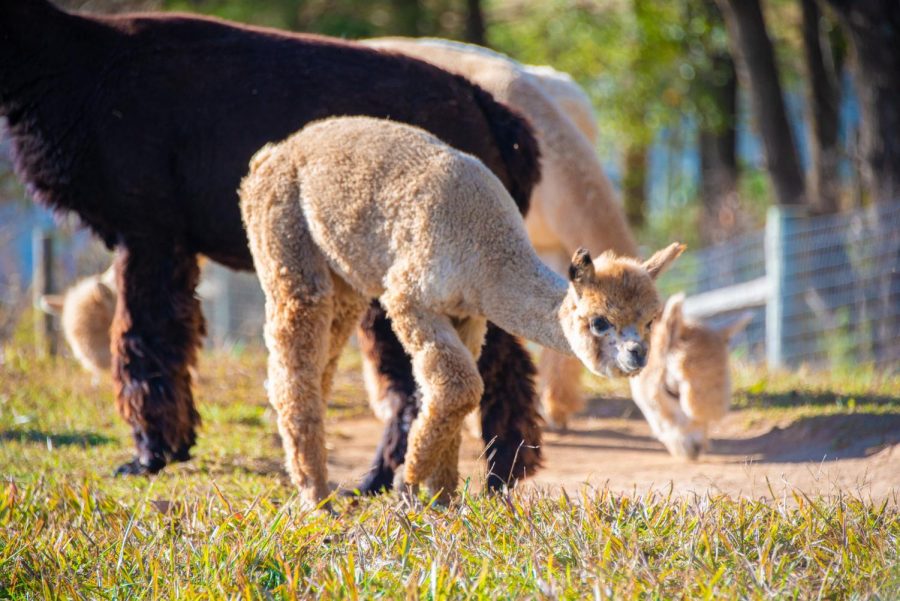Hobby turned business, family-owned alpaca ranch provides fiber to community
Alpacas wander the field on Oct. 24, 2019 At the Rolling Oaks Alpaca Ranch. The ranch, which is run by a mother-daughter duo, bought its first Huacaya alpaca eight years ago, Morgan Stevenson, director of the ranch, said. Now, there are 22 alpacas on the ranch.
November 1, 2019
A family-owned alpaca ranch in Makanda has been providing local products from alpaca fiber and hosting themed events for the past three years.
The ranch, which is run by a mother-daughter duo, bought its first Huacaya alpaca eight years ago, Morgan Stevenson, director of the ranch, said. Now, there are 22 alpacas on the ranch.
“We actually got into raising alpacas because I wanted softer yarn to crochet with,” Stevenson said.
Advertisement
From there, the hobby slowly transformed into a business. Judy Hoepker, owner of the ranch, said they were putting money into the alpacas, but they were not gaining anything from it. So, they began to create products since they had the resources.
“We make a lot of our stuff right in our store like the soaps and dryer balls completely from scratch,” Stevenson said. “We crochet, we knit, we felt, we weave, we do a lot of that.”
The ranch also supports other local businesses by purchasing products or materials they need from other businesses in the area.
“We have our T-shirts made locally, the goat milk we buy for our soap comes from Cobden, we get the lard from Anna. We try to support as much local of what we need to finish our products as well,” Hoepker said.
Some products Rolling Oak sells in their shop are mittens, hand crocheted toys, felted goat milk soaps, scarves, gloves and much more.
“We provide things that people need, when it gets cold you need to be warm,” Hoepker said. “We provide something unique. Not everybody has alpaca, not everybody can get alpaca, so we have some quality and unique items.”
A single alpaca, Hoepker said, can produce around six pounds of fiber with about two to four pounds being usable. They are sheared only once a year in spring, generally in April, she said.
Advertisement*
“On shearing day, once the fleece is off the animal we skirt it, which means we take the fiber from the outside that is different than the main blanket, the part we want to put into the yarn,” Hoepker said.
The alpaca fiber is ranked from one to six, Stevenson said, with one being the softest fiber an alpaca can produce and six being the coarsest.
External factors, Hoepker said, can also affect yield or ranking of the fiber. Diet, stress, environment and pregnancy are only a few examples.
“I can turn a rank two [fiber] into a rank one, or a rank two into a rank three just depending on what I feed them,” Hoepker said.
According to Rolling Oak’s website, the ranch also offers private tours, yoga with alpacas, painting with alpacas, Christmas with alpacas and more.
The ranch also travels with three alpacas, Maca, Elon and Sly, to off-site events held at locations such as StarView Vineyards and Rendleman Orchard.
“We are going to do more events where we’re taking [alpacas],” Hoepker said. “We’ve done wedding events, photoshoots, things like that.”
Hoepker and Stevenson have since become fiber consultants through sorting, grading and classing alpaca fiber. They are currently waiting for their certification to become master classers and specialize in alpaca fiber.
“Since [starting], we’ve taken every class, course, seminar that we can to learn as much as we can about the animals because when we got into it we had no mentor,” Hoepker said. “There was nobody around here to help us because we did it by ourselves.”
In the future, Hoepker said, the ranch is planning on adding an event center to the property and possibly adding cabins in the next five years, as well as breeding for more show-quality alpacas.
Staff reporter Elizabeth Biernacki can be reached at [email protected] or on Twitter at @EBiernacki_619.
To stay up to date with all your southern Illinois news, follow the Daily Egyptian on Facebook and Twitter.
Advertisement









